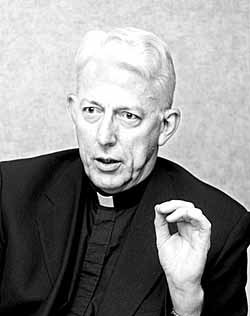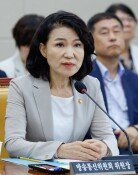Abortion, euthanasia & death penalty deny life
Abortion, euthanasia & death penalty deny life
Posted July. 26, 2000 10:18,

¡º Father Edward A. Malloy, the president of the University of Notre Dame, paid a visit to Korea, and the Dong-A Ilbo had an interview with him on July 24. Notre Dame is one of the top 20 universities in the US. It was founded in late November 1842 by a priest of the Congregation of the Holy Cross, Rev. Edward Sorin. It is an independent national Catholic university located in Notre Dame, Indiana. The University of Notre Dame is said to be a Catholic academic community of higher learning, a view rooted in its connection to the Congregation of the Holy Cross. It has many notable alumni, including Pedro Rossello, Governor of Puerto Rico, Dr. James Muller, cofounder of Physicians for the Prevention of Nuclear War (recipient of the 1985 Nobel Peace Prize), Joseph Montana, famous football player and Ernesto Perez Balladares, former president of Panama.
Rev. Edward A. Malloy, C.S.C., Ph.D. is in his third five-year term as president of the University of Notre Dame. The University`s 16th president, Father Malloy was elected by the Board of Trustees in 1986 after serving five years as vice president and associate provost.
Father Malloy is a full professor in the Department of Theology and has been a member of the Notre Dame faculty since 1974. A rarity among university presidents, he continues to teach, conducting a seminar for first-year undergraduates each semester.¡»
Q: We cannot thank you enough for your visiting Korea, and especially having an interview with Donga-A. We heard that you represent the American intellectual and educational world. Dong-A Daily news was founded in 1920 and is the oldest paper in Korea. It also has the largest circulation, now issuing 2 million papers everyday. Our readers will see you granting this interview as a great honor.
A: I have something to say in advance before the interview. All of the questions I expect to be asked are related to fundamental values-the meaning of life, the worth of the human person, the social responsibility of church and society for the unborn, the handicapped, the elderly, and even the perpetrator of serious harm to another, and the role and function of law in serving the common good. In addition, the goals and purpose of human sexuality are very much related to these other questions. I respond as a person, as a Christian believer, as a priest and educator and as an ethical or moral theologian.
Q: First of all, We know that you and Notre Dame emphasize the dignity of life based on Christian ethics. But this standpoint is being threatened by rapid progress with genetic engineering and information technology. Do you have any particular view on this?
A: Modern science has had a mixed influence on our lives and well being. On the other hand, we live longer and healthier, and have greater control over the firmer scourge of human existence (disease, famine, natural disaster). We travel faster and farther, communicate more easily, have a higher educational level, and interact across cultures more frequently than ever before. On the other hand, we can kill each other more easily and more extensively, be seduced by the sheer accumulation of material goods, and lose our sense of family and tradition. The power of television, movies, music and the internet can be controlled and misused by the few to the detriment of the many.
The use of science and technology, including genetic engineering, partakes of both of these possibilities. We must be open to the healing and transformation that scientific breakthroughs can bring (e.g., organic transplantation, heart surgery, cancer prevention). The more we know about the human body and how it works, the better. Nevertheless, we must be alert to the potential harm that scientific applications can bring. Some forms of genetic engineering call into question the notions of personhood, parent and responsibility we take for granted. There is a need for humility in the temptation to pray to God. Some forms of intervention put at risk the very dignity of the human person in the relationship that medicine is called to serve.
Q: There are lots of possible dangers to human life. For example, murder, massacre, torture, abortion and euthanasia are regarded as denials of life. The most serious problem among these in Korea is abortion. Currently 2 million surgical abortions a year are performed here on average. This means 5560 babies a day and 230 babies an hour are killed before they are born, and it gives Korea a bad name as the world`s number one abortion country. In addition, its shocks us that 60% of those who kill babies are young girls in their teens and early twenties. What do you think of the problem of abortion? How can we solve the problem?
Q: I believe abortion is the taking of human life. It is often argued that it should be allowed by society because the rights of the woman to self-determination supersede the rights of the embryo/fetus (which some consider not yet fully human). I disagree. Instead society (and the church) has the responsibility to assist women who find themselves pregnant and who do not want to assume the parenting role. These women may be poor, in bad health, immature or otherwise conflicted. Of course the man involved in the pregnancy must be also held responsible and required to provide support. In some cases after the birth of the child, adoption is the best alternative.
Q: We note that abortion has been one of the hottest issues in US history. Roe v. Wade gave legal rights to people who want freedom of choice. Recently the partial birth controversy was debated in the Supreme Court. How do you expect these issues to progress in the future?
A: America is torn at every level by the abortion debate. One group describes itself as pro-choice, the other as pro-life. Our present laws are among the most liberal in the world. Serious efforts have been underway for decades by pro-life groups to overturn the Roe vs. Wade decision. The partial term abortion debate is one example of this ongoing controversy.
I consider partial term abortion to be even more offensive than earlier stage abortion. I do not understand how it can be defended unless you also justify infanticide. Abortion as a volitive moral and political issue in America will not go away. I hope and pray that more people can be persuaded that it is a violation of the rights of innocent, unborn human life and that our laws can reflect this insight.
Q: If someone has terminal cancer and is in serious pain, so tries to kill himself with a doctor`s assistance, is the incompatible with human dignity? How about Dr. Kevorkian`s acts? Some countries legalize euthanasia and allow terminal patients to reject medical treatment. What do you think of this?
A: The practise of euthanasia is a direct attack on the dignity of human life at the last stages of life (usually) as abortion is at the first stages. Those who are in the dying process are deserving of full human care and medical relief. Not everything that could be done should be done. Yet the premature attempt to speed up the dying process (on the grounds that this better expresses care for the dying) is morally offensive. I consider Dr. Kevorkian a publicity hound, who is an embarrassment even to the position that he claims to represent. We have the medical capacity to ease the pain of most people who are dying. We should use it responsibly.
Q: How about the death penalty? More than 100 countries have abolished the death penalty over the past decades. The US executes more than 70 prisoners a year. How shall we evaluate this issue in terms of human dignity? Many of Koreans seem to think that it is too early to abolish the death penalty when we consider the protection of citizens from crime. Do you think that death penalty does work to protect citizens?
A: I believe that the death penalty is unnecessary and counter-productive in modern society. It does not achieve the goals it claims to serve. There is no convincing evidence that the death penalty restricts violent crime or contributes to a greater respect for law and the value of human life. Instead it asks some citizens on behalf of the state to kill other citizens. In the process it contradicts the very value it claims to be defending. Pope John Paul II has called for a universal renunciation of the death penalty. I agree. I hope we can achieve that goal in the United States sometime soon.
Q: How about homosexuality? Catholic leaders, including late Cardinal O`Cornel, strongly criticized it. Human rights activists, however, argue that homosexuality should be protected in the name of human rights.
A: Homosexuality is one of the most difficult moral issues to talk about because people start with such strong feelings on all sides of the debate. One`s human worth before God is not determined by one`s sexual identity. Heterosexuals, homosexuals and those of uncertain sexual identity are equal and deserving of respect and legal protection.
What is at issue is not sexual identity but rather sexual acting out according to one`s perceived identity. The catholic church teaches that homosexual people are called to live chaste lives in which the fullness of sexual expression (as in a committed marital relationship) is not morally available. As in unmarried heterosexual relationships. the demands of a chaste life are more difficult for some than others, for those who fail, God`s mercy and forgiveness are available.







